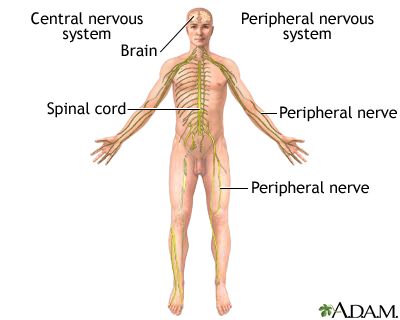Pregnancy SmartSiteTM
InformationA neurologic deficit refers to abnormal neurologic function of a body area. This altered function is due to injury of the brain, spinal cord, muscles, or nerves that feed the affected area. Examples include:
ReferencesDe Luca GC, Griggs RC, Johnston SC. Approach to the patient with neurologic disease. In: Goldman L, Cooney KA, eds. Goldman-Cecil Medicine. 27th ed. Philadelphia, PA: Elsevier; 2024:chap 366. Jankovic J, Mazziotta JC, Newman NJ, Pomeroy SL. Diagnosis of neurological disease. In: Jankovic J, Mazziotta JC, Pomeroy SL, Newman NJ, eds. Bradley and Daroff's Neurology in Clinical Practice. 8th ed. Philadelphia, PA: Elsevier; 2022:chap 1. Klatt EC. The central nervous system. In: Klatt EC, ed. Robbins and Cotran Atlas of Pathology. 4th ed. Philadelphia, PA: Elsevier; 2021:chap 19. | |
| |
Review Date: 2/11/2025 Reviewed By: Joseph V. Campellone, MD, Department of Neurology, Cooper Medical School at Rowan University, Camden, NJ. Review provided by VeriMed Healthcare Network. Also reviewed by David C. Dugdale, MD, Medical Director, Brenda Conaway, Editorial Director, and the A.D.A.M. Editorial team. The information provided herein should not be used during any medical emergency or for the diagnosis or treatment of any medical condition. A licensed medical professional should be consulted for diagnosis and treatment of any and all medical conditions. Links to other sites are provided for information only -- they do not constitute endorsements of those other sites. No warranty of any kind, either expressed or implied, is made as to the accuracy, reliability, timeliness, or correctness of any translations made by a third-party service of the information provided herein into any other language. © 1997- A.D.A.M., a business unit of Ebix, Inc. Any duplication or distribution of the information contained herein is strictly prohibited. | |

 Nervous system
Nervous system
